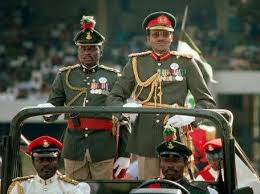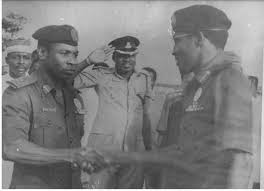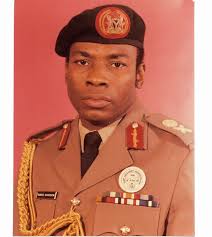Major General Tunde Idiagbon remains one of the most iconic figures in Nigeria’s military and political history. Known for his discipline, integrity, and unwavering
commitment to national service, Idiagbon’s legacy is intricately linked with the country’s quest for order and good governance. Babatunde “Tunde” Abdulbaki Idiagbon
(14 September 1943 – 24 March 1999) was a Nigerian general who served as the 6th Chief of Staff, Supreme Headquarters (second-in-command) under military head of state General Muhammadu Buhari from 1983 to 1985.
Early Life and Military Career
Born on September 14, 1943, in Ilorin, Kwara State, Babatunde “Tunde” Abdulbaki Idiagbon joined the Nigerian military in 1962. His military career was marked by rapid
ascension through the ranks, demonstrating exceptional discipline and leadership. Idiagbon was a product of the Nigerian Defence Academy and furthered his military
education in countries such as India and the United States.
The Buhari-Idiagbon Regime
Idiagbon is best known for his role as the Deputy Head of State under General Muhammadu Buhari’s military government, which came to power through a coup on December 31, 1983. The Buhari-Idiagbon regime was characterized by a stringent approach to governance, prioritizing anti-corruption measures, economic discipline, and national security.
War Against Indiscipline (WAI):
One of the most notable initiatives of the Buhari-Idiagbon regime was the War Against Indiscipline (WAI). Launched in March 1984, WAI aimed to instill public order,
discipline, and a sense of national pride among Nigerians. The program addressed issues such as punctuality, cleanliness, queuing culture, and anti-corruption efforts.
Anti-Corruption Efforts
The regime undertook significant anti-corruption campaigns, targeting public officials and individuals involved in corrupt practices. These efforts were marked by
strict enforcement and the imposition of severe penalties for corruption.
Other news: https://www.youtube.com/watch?v=AaNdBFnYHHc
Idiagbon’s Personal Ethos
Idiagbon was renowned for his personal discipline and integrity. He led by example, demonstrating a commitment to the principles he advocated. His austere lifestyle
and dedication to duty earned him respect and admiration, both within the military and among the general public.
Challenges and Overthrow
Despite the positive aspects of their governance, the Buhari-Idiagbon regime faced criticism for its authoritarian approach and human rights abuses. The regime’s
strict policies and economic measures were seen as harsh by many, leading to growing discontent. This discontent culminated in a coup on August 27, 1985, led by
General Ibrahim Babangida, which ousted Buhari and Idiagbon from power.
A Glimpse of Idiagbon and Buhari Administration in Nigeria:


As an industrious, brave and gallant soldier, Mr Idiagbon never missed any promotion.
He became a captain in 1968 during the bloody Nigerian civil war. In 1971, he was promoted to the rank of major and in 1974, he became a lieutenant colonel. He was decorated
with the rank of a full Colonel in July 1978. In May 1980, this enviable son of Ilorin was elevated to the rank of a brigadier-general. He was eventually promoted to the rank of major-general in 1984.
In the course of his outstanding military services, this gallant soldier held various command posts. He was the commander, 4th Battalion of the Nigerian Army from August
1965 to February 1966. He was the sector commanding officer, 20 Battalion from October 1967 to February 1968, and also served in the same capacity at the 125 Battalion from 1968 to 1970.
This remarkable apostle of discipline was the brigade-major and deputy commander, 33 Brigade between March 1970 and March 1971. He served as the commander, the
29 Brigade from March 1971 to December 1972.
As a result of the military involvement in the political administration of Nigeria, coupled with his glittering erudition and alluring leadership skills, the late Mr. Idiagbon
was a star in the succeeding military regimes which ruled the country from the end of the civil war to 1979 and between December 31, 1983 and August 27, 1985.
He was appointed the general staff officer, grade 1, and later principal staff officer, Supreme Headquarters, from January 1973 to August 1975. He also served as a
member of the governing council of the University of Jos, Plateau State.
The Administration Continued
Mr Idiagbon’s direct political appointment, however, began in August 1978 when he was made the military administrator of the old Borno State.
He was at the same time the commander, 33 Brigade of the Nigerian Army, Maiduguri, as well as a member of the National Council of States till October 1, 1979 when
he handed over the administration of the then Borno State, which included the present day Yobe State, to Mohammad Goni who was elected governor on the platform of the Great Nigerian Peoples Party (GNPP).
From October 1979, General Idiagbon was the director, manpower and planning, army headquarters, till February 1981.
Between 1981 and 1983, he was the military secretary (army). He was on that position when he and his colleagues overthrew the government of Shehu Shagari,
which they accused of mismanagement of the nation’s resources.
While Mr Idiagbon was, no doubt, the engine room, the brain box, and the star boy of the military regime headed by Mr Buhari, the story of how he emerged as
the deputy head of that corrective government needs to be shared for us to have an insight into that unique ‘leadership partnership’ he built with his lanky boss and friend.
It was, indeed, very clear that neither Mr Buhari nor Mr Idiagbon was the initiator of the coup that toppled Shagari. They were, however, the greatest beneficiaries
of the plot, courtesy of their integrity and decency.
Mr Buhari was said to have been invited to head the government as a way of adding the much-needed legitimacy to the desire of the military adventurists in power
who initiated and executed the coup.
In Conclusion:
Such invitation was premised on Mr Buhari’s profound administrative experiences and infectious integrity, which characterised his career as the military governor in
charge of the present day north-east region, as well as being the minister of petroleum and chairman of the Nigerian National Petroleum Corporation (NNPC).
Mr Buhari was said to have accepted to lead the government only on the condition that he would be given the absolute liberty to select his deputy. Because Mr Buhari
was so needed, he was allowed to make his choice and the lot fell on Mr Idiagbon because of their apparent compatibility in the realm of background, career path, integrity, personality, and political philosophy.
It was, therefore, not surprising that the duo not only worked seamlessly throughout, but the latter was given free hand to operate. That alluring working relationship
saw him dominating the government so well that for the first and only time in the political history of Nigeria, the names of the head and his deputy were used to ‘nomenclate’
the administration as the Buhari/Idiagbon regime, even when the head of state did not pass on while in office.
Adding credence to that assertion, Mr Buhari had said in an interview granted a news magazine in 1993 that Mr Idiagbon was among the three Nigerian military officers
he trusted and respected most. He added that the case of Mr Idiagbon was even unique among the trio because Providence had always made Mr Idiagbon to either serve
under him or take over offices he had previously occupied, and he always left those places better off.
Post-Regime Life
After the coup, Idiagbon was detained for three years before being released. Upon his release, he retired from public life, focusing on personal and community development until his death on March 24, 1999. Despite his retirement, Idiagbon’s influence continued to be felt, particularly in discussions about discipline and governance in Nigeria.
Legacy and Impact
Idiagbon’s legacy is a testament to the enduring values of discipline, integrity, and national service. His role in the War Against Indiscipline remains a reference point in
Nigeria’s efforts to combat corruption and promote civic responsibility. Although controversial, Idiagbon’s contributions to Nigeria’s political and social fabric are undeniable,
and his life serves as an example of dedicated public service. Major General Tunde Idiagbon’s life and career offer valuable lessons in leadership, discipline, and governance.
His legacy continues to inspire discussions on the importance of integrity and the role of strong leadership in national development.
While his methods and the regime he served under remain subjects of debate, Idiagbon’s commitment to his principles and his impact on Nigeria’s political history are clear and enduring.
Read Also: https://placesandlifestyle.com/the-old-and-new-nigerian-anthems-a-reflection-of-national-identity/




